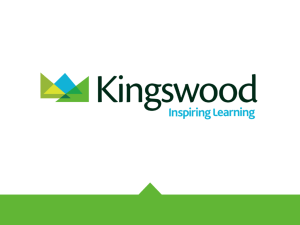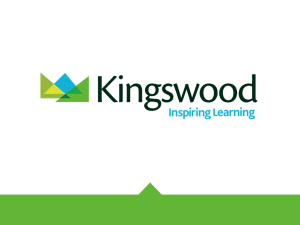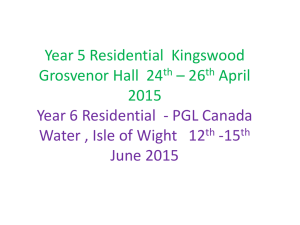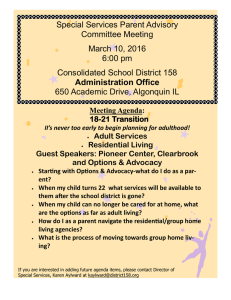Inspiring Learning Outcomes
advertisement
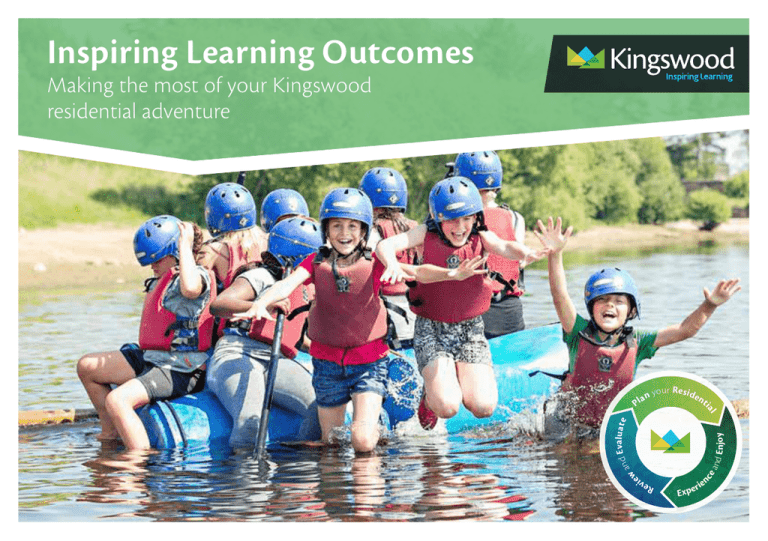
Inspiring Learning Outcomes Making the most of your Kingswood residential adventure an y o u r Re s i d en ti ce w an d an d En j o y Evaluate al Pl Exp e rie n Rev ie Contents. Introduction Maximising the impact Inspiring learning outcomes Quality outdoor learning experiences Our theory of change model Plan Planning your residential checklist Independent research Designing your programme Our learning outcomes Our activities Do Our sessions plans Review Making learning links The use of technology Building resilience Further reading Meet some of the team Our centres 3 4 6 8 10 12 15 16 17 18 20 21 22 23 24 25 “Some children shone as leaders who, back at school, appeared to be happy working on their own, and as a result have taken on different roles in the classroom. Children who previously did not attend after school clubs or sports clubs have since joined after returning to school. A number of parents are now engaging more with what school has to offer.” - Hartlepool School, 2015 Maximising the impact We are committed to helping schools, youth groups and individuals get the most from our residential programmes, and we are raising the bar to provide the very best outdoor learning experiences. We believe that by working in partnership with schools and teachers we can create life changing adventures that have a measurable impact back in school, helping to influence the futures of thousands of young people every year. We are consultants, supporters and experts We recognise that school is where the majority of learning takes place and we are passionate about working with teachers to continue their Kingswood adventure back in the classroom. We have a team of experts across our centres and in our support areas to help you plan, deliver and transfer our powerful learning opportunities. Working closely with non-formal learning specialists to link their work to our programmes, we want to develop self-confidence and empower and engage young people. Inside this booklet you will find more information about how our programmes are designed to maximise the impact of your residential and a few simple things you can do to make your experience even more powerful. We are delighted that you have chosen Kingswood and we are looking forward to welcoming and inspiring you and your pupils soon. With all the very best wishes for your learning journey. Matt Healey, Head of Learning and Adventure Inspiring learning outcomes We have linked what we do to a simple model that communicates how we work – we call it ‘inspiring learning outcomes’. Using this model we can provide a framework to help you and your students make the most of your Kingswood residential experience. an y o u r R e s i d en ti Rev ie p er Exp e rie i en c e an d E n nj ur lu a Plan te and Eva va v i ew lua te yo Re dE Re s R e v i e w an i d e n ti a l oy Ex ce w an d an d En j o y Evaluate al Pl en ti a l y id njo es an Pl a n y o u r R E x p er i enc e dE Plan When planning your residential, consider and speak to our specialists about: • how your residential fits into the school curriculum and your learning objectives • what you are hoping to achieve as a result of your stay • how we could help you design the most effective residential programme for your group • what pre-work you could do to prepare your young people for their experience Do As you arrive on centre for your Kingswood adventure, consider and speak to our expert team about: • whether your needs have changed or developed since you planned your programme • how you will assess the learning that is taking place •the tools that you could use during the residential to record the learning taking place and how you can make the most of the support offered by our on centre specialists Review Following your residential, consider and speak to your dedicated customer service consultant about: •what changes you can observe in class, or how can you demonstrate that learning has taken place in your youth work programme •planning your next residential, taking the best of your recent stay and building on the success of your experience for next time, to ensure that each residential adventure you experience with Kingswood gets even better every time yo i d e n ti a l R ev i e w an Re s dE 5 Introduction Plan ur va te a u l pe jo n dE y Ex r i en c e an Quality outdoor learning experiences FR EE CPD session included Successful outdoor residential experiences provide challenge, build confidence, promote independence and forge life-long friendships; they also increase pupil engagement and attainment once back in the classroom*. Each of our education and adventure centres has been carefully designed to provide a safe environment in which we offer a wide range of adventurous activities and learning opportunities, both indoors and outdoors. We believe passionately in the benefits of taking children outside the classroom to learn and every year we welcome schools, youth groups and uniform groups from all over the country, many of them returning year after year. We are committed to helping schools make the right choices for their outdoor learning adventure. We have worked in partnership with a number of professional bodies to design a CPD session for teachers and youth workers to share current thinking and good practice in outdoor learning, residential experiences and the learning outside the classroom environment. Our CPD session is included as part of your residential package as is available for you to join during your visit. *In long-term follow-up surveys, 82% of KS2 pupils said their teachers and lessons on the residential helped them learn; 75% of KS2 students said that their residential experience helped them realise they could get on with people from other classes or schools; 78% of KS2 pupils felt more confident to try new things they would not have done before the residential. Learning Away Final Evaluation Report, York Consulting 2015. Learning Outside the Classroom We have earned the Learning Outside the Classroom Quality Badge, which is the nationally recognised indicator of good quality educational provision and is only achieved after meeting a set of quality indicators. Safety management Our centres are regularly inspected as part of our internal health and safety audit programme, and we work closely with outside experts to ensure we remain at the forefront of accepted good practice. We are founding members of the British Activity Providers Association (BAPA) who regulate our industry and are accredited by other agencies such as Adventure Activities Licensing Authority (AALA), Institute for Outdoor Learning (IOL), Adventuremark and the Council for Learning Outside the Classroom Quality Badge, plus many activity National Governing Bodies. Risk assessments Risk assessments form the building blocks for ensuring effective health and safety management at every Kingswood centre, and underpin the health and safety of all our programmes. Some higher risk activities, such as watersports, require the provider to prove they meet additional safety standards, of which our accreditations can be seen below. We are happy to support you with any documentation or certification needed prior to your visit. Secure centres Our Kingswood centres are secured by fencing and electronic gates and supported by night patrols where needed, plus mandatory guest passes. All aspects of our learning and activity sessions are risk assessed and all of our employees undergo enhanced DBS checks, plus regular assessments. 7 Introduction Visiting an established organisation like Kingswood ensures you have the peace of mind that the safety of our guests and staff is our priority, and it has been for over 30 years. Our theory of change model Team work Work constructively as a team member Communication Communicate effectively with others during the activity Young people and their leaders share and understand their objectives for the residential Young people arrive at Kingswood Visiting staff share their outcomes with their Kingswood colleagues on centre Learning Outcomes Young people build trust in the centre teams and each other, and prepare for a brilliant residential Problem solving Devise a plan, execute it and review its effectiveness in solving a problem Resilience Be able to demonstrate resilience through exposure to failures or setbacks Young people experience a selection of exciting and fun adventure activities Motivation Be an enthusiastic and motivated group member Leading and supporting Use clear communication skills and language as a group leader or supporter to others Self confidence Demonstrate self-confidence in themselves and trust in others Challenge and risk React positively to challenges and manage appropriate risk taking Learning a skill Demonstrate a new skill, technique or competence Environmental awareness Show an understanding of how their behaviour effects the environment (local or global) 9 Introduction Young people develop self-confidence, trust and resilience Young people and staff work together to achieve and enjoy a brilliant residential Young people learn by being active and having experiences in the outdoors Teachers and leaders link the residential experience to other learning activities outside Kingswood Young people leave their residential energised and motivated. They have overcome personal challenges and had a great time whilst learning important new skills that prepare them for the future Planning your residential checklist The Department for Education’s definition of a ‘whole school approach’ is ‘a cohesive, collective and collaborative action in and by a school community that has been strategically constructed to improve student learning, behaviour and wellbeing, and the conditions that support these.’ At Kingswood we commit to reinforcing the whole school approach to learning by creating a ‘whole centre approach’, allowing the maximum benefits from every residential to provide inspiring learning experiences to young people. Here are some questions to consider as you prepare and plan your Kingswood residential: Plan • • • • • consider how you can involve your students in the content of your residential have you utilised a theory of change model to plan your residential’s impact? have you thought about how you could maximise the social aspects of your residential? is everyone aware of your planned learning outcomes? have you linked the learning to the school curriculum? Experience and enjoy • have your considerations and planning been discussed with the Kingswood delivery team? • will you review these outcomes regularly during the residential? • have you considered how you might be able to accommodate additional outcomes which emerge? •are you and your colleagues collecting evidence by keeping a diary or questioning your group during the experience to affirm the benefits of the residential? Review and evaluate • does your school use an action research model to evaluate and develop good practice? • have you considered how you will embed the learning from the Kingswood experience back in the classroom? • have you been able to work in support of colleagues from other schools or groups on centre at the same time? •are there opportunities to share ideas on maximising the impact of your Kingswood experience with other colleagues on centre from different schools? 11 Plan Notes Independent research: Independent evidence of the impact The benefits of outdoor learning are well known and supported by independent research and the government. As a result of working over five years with its partner schools, Learning Away, developed by the Paul Hamlyn Foundation has begun to understand what high-quality residential learning means, and has coined the phrase ‘brilliant residentials’ to describe these experiences. The objective of the Learning Away project was to demonstrate whether: •the residential has a strong positive impact on academic achievement and a wide range of student outcomes • the residential can transform the learning experience of students • the residential can help transform schools • investment in residential learning is money well spent Brilliant residentials are defined as school trips with at least one overnight stay, which are: • led by teachers (and, where appropriate, students) • co-designed with students • fully integrated with the school curriculum and ethos • inclusive and affordable • deliberately planned to meet students’ specific learning needs • part of a progressive programme of experiences • designed to include a wide range of new and memorable experiences •designed to allow space for students to develop collaborative relationships with both peers and staff • evaluated rigorously • planned so that learning is embedded and reinforced back in school • supported by senior leadership From the Learning Away Final Evaluation Report, York Consulting 2015: “Learning Away has shown that a residential learning experience provides opportunities, benefits and impacts that cannot be achieved in any other educational context or setting. Throughout the evaluation process, impacts on relationships (both studentstudent and staff-student) and on students’ confidence were strongly and consistently demonstrated. The strength of relationships developed was significant and often unexpected. There was also strong evidence that impacts in these areas led to positive outcomes in terms of students’ engagement with and progress in, their learning, as well as their self-belief and expectation that they would make progress and succeed”. 13 Plan In their final evaluation report, Learning Away’s independent evaluators have provided evidence confirming that, by working in this way, schools can achieve significant breakthroughs in learner engagement and progress, while achieving positive outcomes for teachers and the school as a whole. These views are echoed by the government/ government funded bodies. Lord Nash, Parliamentary Under Secretary of State for Schools (2014) The Department for Education has assessed the evidence of the impact of learning outside the classroom on attainment, social skills and other outcomes. In 2008, Ofsted reported that good quality education outside the classroom led to improved outcomes for pupils, including better achievement, standards, motivation, personal development and behaviour.* The Education Endowment Foundation (2014) which is funded by the Department for Education, found that outdoor adventure learning interventions consistently show positive benefits on academic attainment and wider outcomes such as self-confidence. The research found that, on average, pupils who participate in adventure learning interventions appear to make approximately three months additional progress over the course of the year. At Kingswood, we are absolutely committed to providing brilliant residentials, and we feel passionate about ensuring that as many young people as possible can have access to these experiences. We have incorporated all of this research into our approach to Inspiring Learning Outcomes and our theory of change model. *2008 Ofsted Report “Learning Outside the Classroom. How far should you go? Step 1: Select your special interest and programmes Step 2: Choose up to three learning outcomes Step 3: Add your activity category preferences Fun, adventure and an action-packed programme all come as standard with a Kingswood experience. But we can provide so much more than that. Sometimes it’s the little, unexpected things that give the young people that visit us the biggest sense of achievement. It might be the experiential education that we provide, breaking down the barriers of a more formal classroom environment that allows the shyest to shine as leaders, whole classes to bond and be captivated over just one session and the unmotivated to become the most enthusiastic about developing a new skill. We feel passionate about giving these experiences to as many young people as possible. It’s why we do what we do. Step 1: Our specialist interest areas Personal Development Discovering Nature Sports and Skills These programmes use our adventurous activities to teach new skills, challenge ideas and inspire young people. From Bushcraft to Environmental Field Studies, these programmes are focused on exploring the natural world. From developing practical skills, to self-expression and creativity, these programmes build self-confidence. Adventure Choice Environmental Field Studies French programmes Choose pure adventure and your programme will focus on a selection of our activities encouraging team work and physical exercise. These programmes inspire students with a passion for the natural world and are tailored to meet the needs of your school and the curriculum. The Château provides a perfect base from which to explore the many historic and cultural highlights of northern France. 15 Plan Designing your personalised programme is easy: Step 2: Our learning outcomes Alongside the direct learning outcomes that you can weave into our session plans, with each Kingswood adventure, you also have the opportunity to select up to three of our suggested indirect learning outcomes, which enable us to further tailor each of our activity sessions to maximise their impact for your group. Our 10 learning outcomes are: Team work Work constructively as a team member Communication Communicate effectively with others during the activity Problem solving Resilience Motivation Devise a plan, execute it and review its effectiveness in solving a problem Be able to demonstrate resilience through exposure to failures or setbacks Be an enthusiastic and motivated group member Leading and supporting Self confidence Challenge and risk Learning a skill Environmental awareness Use clear communication skills and language as a group leader or supporter to others Demonstrate self-confidence in themselves and trust in others React positively to challenges and manage appropriate risk taking Demonstrate a new skill, technique or competence Show an understanding of how their behaviour effects the environment (local or global) 17 Plan Step 3: Our activities We’ve grouped our activities into categories, of which you can select up to three to include in your programme. All of our categories ensure that your group is able to experience a varied range of our adventures, and they are coupled with your chosen learning outcomes for maximum benefit. Our activity categories are: Challenge Get creative Go explore In the air On the water Get active We also have a range of specific evening activities which will be incorporated into your programme Our session plans All of our sessions are planned against your selection of specific learning outcomes. Our session plans are intended to provide a useful focus on educational outcomes. Example Kingswood session plan Instructor led activity Student led activity Shared activity Example session outline - Problem solving Problem solving sessions are made up of series of obstacles/problems for students to overcome. The activity can challenge students both physically and mentally. Problem solving skills will be used and aspects of teamwork can be explored. The activity offers chances for students and teachers to explore spoken language skills. Learning outcomes: (Indirect transfer of learning outcomes)* • work constructively as a team member • communicate effectively with others during the activity • devise a plan, execute it and review its effectiveness in solving a problem • be able demonstrate resilience through exposure to failures or setbacks •use clear communication skills and language as a group leader or supporter to others *All possible outcomes are listed for demonstration purposes. • react positively to challenges and manage appropriate risk taking • demonstrate self-confidence in themselves and trust in others • be an enthusiastic and motivated group member •show an understanding of how their behaviour effects the environment (local or global) • demonstrate a new skill, technique or competence Session prep Introduction Main activity Review End of session Teaching activity • • • • • check group medical information establish learning outcomes that the teachers, group or individuals would like to achieve pre-use inspection of the obstacle course activity area including visual inspection of elements collect helmets (where required) and check prior to the session collect any additional resources to develop the session • • • • • set the scene – establish appropriate goals for the group using language appropriate to the group deliver an activity brief introduce the skills required for students to look after each other during the challenges i.e. spotting technique safety brief – course specific requirements for safe use of elements some courses warrant an active participant to have two spotters, if so divide into groups of three Achieving learning outcomes • challenge the group to come up with their own safety brief encourage them to consider the obstacles and what they will have to do to remain safe • vote in students to key roles and encourage ownership i.e. safety warden, element leaders • facilitate the activity – allow the group to explore ways of completing tasks • ensure reinforcement of correct spotting technique throughout and if needed reconvene the group and repeat the need. Reflect and review on spotting and how trust can be increased • for those struggling allow so many foot touch downs • set challenges on certain elements, e.g. one foot stand up on log and lower • discuss teamwork and the importance of trust • encourage students to identify peers that may be struggling and ask them to come up with new ways to achieve the task bearing in mind the skill sets involved • prompt students to share their discoveries about a particular element with each other • encourage the students to question aspects of the problems • • • • • • • the use of visual referencing review techniques could be used here. The teacher could photograph/record these images and use them later back at school revisit the aims set at the beginning of the session and link back to the targeted learning outcomes explore feelings and how they may have changed confirm any learning that may have taken place, and any responsibilities the group may have had facilitate and review highlighting to group successes and elements to improve on for their next session ensure to make the lesson relevant to day to day life (transfer of learning) each child is to demonstrate a new physical skill that has been learnt on the session • take any learning to the next session • ensure the course is left ready for the next group • teachers can build up on this sessions learning by prompting their next activity leader in what has gone on with a view to continuing the theme Some extension activity suggestions for curriculum links: (Direct transfer of learning outcomes) 1 B ack at school in small groups, identify or create an obstacle course and produce a set of instructions, safety requirements and rules, then each group delivers their own mini session to their peers. *Links to English, PHSE and PE 2. Use of photographs, video or sound recording - use the data as a prompt for students to link their experiences to produce a presentation and a piece of art or even a performance of music or dance. *Links to English, Computing and Creative Arts 3. Design/build a scale model of an obstacle that has to be strong enough to support a load representing a group of young people. *Links to Design & Technology, Physics and Maths 19 Do Stage Making learning links after your ‘brilliant residential’ Good examples of ‘direct’ extension activities from our 3G swing session could be: ‘3G swing’ is named in relation to the expected gravitational force experienced by the participant during the swing. Using the swing concept, aspects of the science/physics curriculum such as forces, energy, mass, weight, levers pulleys etc. can be explored. Experiments could be coordinated by the teacher during the activity to gather data which can be used back at school to calculate whether the activity is appropriately named. *Links to Science and Physics Students experience heightened emotions during this activity. These emotions can be captured as part of a piece of written work, a ‘Talking Heads’ type interview or even interpreted through art, music or dance activities. *Links to English, Computing and Creative arts Curriculum links - 3G swing Science, Physics, English, Computing and Creative Arts Examples of how schools could use technology to enrich the Kingswood experience: Before the residential •Explore our website and social media accounts to see what you and your pupils can expect. Encourage parents to do the same, so that they feel more informed about the benefits that the residential can offer their children •Our online programme builder tool will give you a good idea of how we design your adventure. By telling us about your group, your objectives and your preferences we will give you a sample idea of what you can expect on your Kingswood experience. Visit kingswood.co.uk/programmes to give it a go During the residential •Use Twitter, Facebook or your school blog to keep in touch with parents during a residential. Post at a regular time each day to let parents know what you’ve been up to and share photos of different activities to show them how much fun you are all having. Encourage parents to interact with the stories you post After the residential •Once back in school, use your school’s social media platforms or blog to create a report of the residential – using programmes such as Storify to collate tweets •Use photos or video footage of your visit to create a video-montage or slide show. Tweet this to @Kingswood_ using #MyKingswood to share your experiences with us All these activities add value to the whole residential experience and link back to school adding to the ‘whole school’ ethos. They also link directly to the new computing curriculum. 21 Review The use of technology Building resilience with our Realise Your Potential programme We have developed a new personal development programme, ‘Realise Your Potential’, which is designed to increase attainment and well-being among Year 9-13’s by building resilience and improving performance under pressure. We use a mix of our adventurous activities, reflection time and review sessions to equip young people with new life skills, introduce them to a range of challenges and teach them how to be the best they can be. Each activity focuses on different interventions known to improve areas of performance and resilient behaviour facilitated by specially trained staff and supported by workbooks. For young people at Year 9 and above we can provide an impact assessment as part of our ‘Realise your Potential’ programme. For other students we are able to recommend different strategies for evaluating the impact of your brilliant residential and would be pleased to provide opportunities within your programme for this to take place. Please discuss how we can help you with our on centre teams regarding different evaluation approaches. At the end of your stay, teachers will receive coaching and development reports produced by the MTQ48 assessment enabling schools to follow up on each individual’s personal development plan. Areas to improve performance Positive thinking Stop thinking you can’t and replace it with “I can!” Visualisation See the challenge and the situation in a positive light Anxiety control Learn how to not panic and to deal with anxiety Attentional control Focus on doing what we need to do and avoid distraction Goal setting Learn how to break down challenges and turn them into something which is achievable inspiring-learning.com Creating Inspiring Learning Experiences for young people. lotc.org.uk The Council for Learning Outside the Classroom is the national voice for learning outside the classroom. You can also view the Ofsted report: ‘Learning outside the classroom. How far should you go?’ under the ‘Why LOtC?’ section. learningaway.org.uk Through action research, Learning Away has developed clear guiding principles for developing an integrated approach to providing brilliant residentials. outdoor-learning.org The Institute for Outdoor Learning’s work to develop standards in outdoor learning, encourage participation and provide professional development for outdoor learning practitioners. educationendowmentfoundation.org.uk/toolkit An accessible summary of educational research on teaching 5-16 year olds. oeap.info Advice, support and monitoring of visits and outdoor learning. 23 Review Further reading Meet some of the team Across our centres, we employ over 400 talented and passionate activity leaders and outdoor education specialists. We couldn’t fit them all on one page, but you will have the opportunity to meet and be inspired by some more of them on your residential. Matt Healey - Head of Learning and Adventure Ewan Carr, Centre Manager – West Runton Starting out as an apprentice in a small family run outdoor centre, Matt has been working in outdoor education for over 25 years. Ewan came straight to Kingswood in 2003 after completing a degree in Environmental Science at Lancaster University. What’s the best bit? The outdoor learning experience has always been at the core of Kingswood, which is the aspect I hold most dear. It’s not just about being active, it’s about changing perspective and unlocking potential. Favourite activity? Bushcraft, because it provides young people a direct link to nature and natural history. Kathryn Gavin, Activity Leader – Peak Venture Sam Harbour, Environmental Field Studies Manager - Overstrand Hall Since joining Kingswood over a year ago as an Apprentice Activity Leader, Kathryn has gained many qualifications and picked up lots of new hobbies. What’s it really like? The opportunities presented to staff are amazing. As well as developing guests at work, we are also able to further develop ourselves and our knowledge of the industry through various courses. Sam’s led fieldwork expeditions through Western Ireland, Wales, Dartmoor and Hampshire throughout his studies of Biology, Geography, Archaeology and Palaeoecology. Favourite quote? “It’s far more important to be the right kind of teacher than it is to be the right kind of student.” Louis Dentijust 25 Review Our centres Dukeshouse Wood Newcastle Peak Venture Dearne Valley Colomendy Staffordshire West Runton Overstrand Hall Birmingham Cardiff London Grosvenor Hall Calais Isle of Wight Château de Chantereine KINGSWOOD OFFER GREAT OPPORTUNITIES FOR LEARNING, WITH A VARIED PROGRAMME. WE HAVE TAKEN OUR STUDENTS TO THEIR CENTRES FOUR TIMES NOW AND HAVE NEVER BEEN DISAPPOINTED kingswood.co.uk schools@kingswood.co.uk 0800 655 6564 kingswood.co.uk schools@kingswood.co.uk One Jubilee Street, Brighton, East Sussex, BN1 1GE Proud to be part of Accredited by the Watersports for the teaching of English
